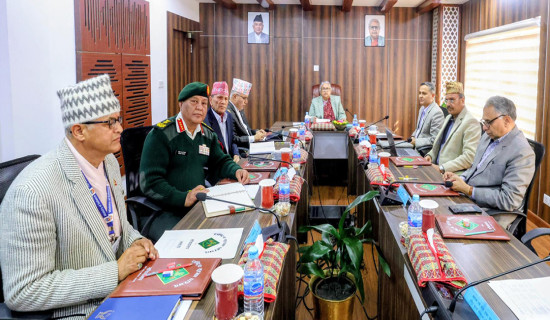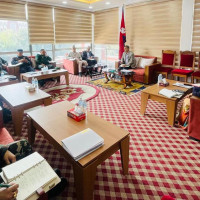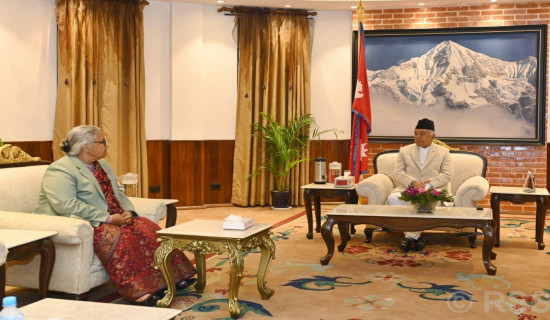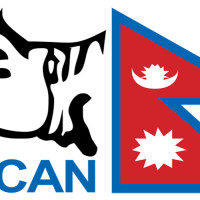- Thursday, 5 March 2026
Lack of resources is biggest challenge: Khadka
Tumwewa Rural Municipality, located in the southern part of Panchthar, is a remote and drought-prone local level. Among the eight local governments in the district, Tumwewa has the smallest population. Covering an area of 147.34 square kilometers, the municipality also faces migration issues. According to the 2021 census, its population stands at just 11,189. Chairman Baburam Khadka, 38, who is also known as a model and actor is leading the rural municipality. Narayan Tumbapo, our Panchthar correspondent, recently talked to him about contemporary issues affecting Tumwewa Rural Municipality.
What has been your experience leading a local government ?
Upon assuming leadership of a local government, I quickly realised that the role comes with both significant challenges and opportunities. In my experience, local governments should be granted both authority and the necessary resources. If allowed to function efficiently and transparently, without political bias or corruption, they can drive significant progress. If all 753 local governments become capable, national development will follow swiftly.
Currently, our biggest challenge is the lack of sufficient resources. The inability to meet public expectations for rapid development stems from inadequate funding. If the federal and provincial governments allocate budgets efficiently and if the leadership of all 753 local governments remains committed, I believe we can successfully lead the country toward prosperity.
How much of your election campaign commitments have you fulfilled ?
Right now, many elected representatives face public dissatisfaction and criticism, particularly on social media. This stems from political leaders making unrealistic promises during their election campaigns, setting expectations they could not meet. However, I did not make such promises during the 2022 election.
I did not prepare a formal election manifesto, but that does not mean we lacked a vision for Tumwewa’s development. We had identified the rural municipality's key problems and proposed practical solutions. By doing so, I earned the trust of the people. My commitment to voters was simple, I pledged to work with honesty and dedication. They trusted me and supported me.
Now, based on available resources and priorities, I am working to ensure the fair distribution of services and development projects. I have not made any decisions against the public interest and I believe the community is satisfied with my efforts.
What are some of your notable achievements so far ?
In the three years since I was elected, we have made significant progress, particularly in infrastructure. Previously, transportation routes in Tumwewa would be blocked for three months during the monsoon. Now, we have ensured that roads remain operational year-round. The construction of a paved road from Lakhuwato to Tumwewa headquarters at Mauwa Bazaar, connecting to the Tamor Corridor, is nearing completion.
Additionally, we have upgraded a 15-kilometrw stretch of the Mauwa–Ranke–Rabi–Bhedetar road, ensuring it remains open throughout the year. These roads are the lifelines of Tumwewa. We have also expanded branch roads connecting municipal wards and settlements.
Improving healthcare services has been a major priority. We are in the final stages of completing a 5-bed hospital. We have also introduced an ambulance service that provides free transportation for pregnant women, people with disabilities, senior citizens and those with chronic illnesses. This service has been a great help to the people of remote Tumwewa.
Additionally, we have beautified major market areas such as Jorsalla, Mauwa, Dashami and Tilkeni by developing essential infrastructure. Through coordination with the federal and provincial governments, we are implementing projects that prioritise sustainability, ensuring that development is not only quantitative but also of high quality.
There are allegations that local governments have become centres of corruption. What is your response ?
That’s a very important question. I have been involved in social service and politics since my young age. I have led various organisations and was active in the youth wing of the Nepali Congress party. However, I have always worked with integrity, avoiding personal or party-based biases.
Since assuming this office, my top agenda has been a zero-tolerance policy against corruption. I am committed to this policy and will uphold it throughout my tenure. I believe that my efforts have already discouraged any attempts at corruption within the rural municipality.
What strategies are you implementing to promote development ?
We are following established legal procedures and systematically implementing development projects. We identify local needs, formulate plans and programmes based on public demand and consult with community leaders, experts and professionals.
Our focus is on policies and programmes that support the economic strengthening of our community while preserving our local culture, heritage and environment. We allocate budgets accordingly and ensure that infrastructure projects are both sustainable and high-quality. Being a relatively young chairman, I make sure to consult experienced individuals and adopt a collaborative approach to governance.
What are the major challenges facing Tumwewa ?
The biggest challenge is insufficient funding, which hinders development. Due to the municipality’s remote location, providing quality healthcare and education is also a struggle. We need the support of the provincial and federal governments to address these issues.
Another major challenge is the shortage of drinking water. We are working on the Nawa Khola and the Tamor Lift Drinking Water Projects, but even after their completion, residents will have to pay high tariffs for water. This could pose a financial burden to the low-income families.
Additionally, while Tumwewa has vast fertile land that could boost the local economy, the area suffers from severe drought, making irrigation a major challenge. These issues are the biggest obstacles to Tumwewa’s development.
What are the key opportunities and possibilities for Tumwewa?
Tourism and agriculture hold the greatest potential for Tumwewa. The massive Tamor River flows through this rural municipality, offering opportunities for water-based tourism. Additionally, this rural municipality is home to the beautiful Tumwewa Hill, after which the rural municipality is named. This could be developed into an attractive tourist destination.
Tumwewa is also located near major cities such as Dharan and Damak. If modern agricultural practices are adopted, the region could greatly benefit. There is also the possibility of drawing water from the Tamor River using lift irrigation, but this would require substantial financial investment.
There are reports of increasing out-migration from Tumwewa. What steps are you taking to address this issue ?
The main reasons for migration are the lack of adequate drinking water and the absence of quality education and healthcare services. We are working to improve these facilities through coordination with the federal and provincial governments.
What will be the state of Tumwewa's development at the end of your tenure ?
It is difficult to transform a remote and drought-prone area like Tumwewa into a fully developed place in a short period. However, our efforts are focused on making significant improvements.
By the end of my tenure, a fully functioning 5-bed hospital will come into operation. The rural municipality will have a well-developed road network, making transportation easier. Proper irrigation systems will be in place. There will be noticeable progress in education, cultural preservation and employment generation.
Overall, my goal is to ensure that the people of Tumwewa experience tangible improvements in their quality of life.
How did you feel after reading this news?








-square-thumb.jpg)







